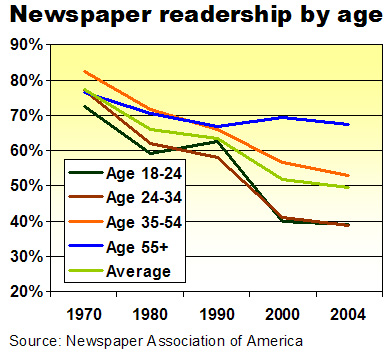Not ready to bag it
With newspaper stocks trading at 52-week lows, some commentators are saying the best days of the publishing business are behind it, and that the industry never will recover from a long-term, or secular, change in the fundamentals of the marketplace.
"The current funk reflects weak advertising trends and concern about the industry's long-term health, stemming from eroding circulation, worsening demographics and a rising preference among advertisers for the Internet," reported Barron's. "One telling statistic: The $82 billion stock-market value of Google tops that of the 12 largest newspaper publishers combined."
On the other hand, some commentators believe the business (and stock prices) will improve with the economy. That would suggest the funk is cyclical.
Newspaper stocks are "potentially one slight pickup away" from turning back into shares that will outperform the market, says analyst William B. Drewry of Credit Suisse First Boston, cautioning nonetheless that the group should be avoided "for the moment, based on sub-par advertising and (earnings-per-share) growth."
His optimism is based on what he witnessed in the last decade. "From 1994 on, the Street was largely bearish on the secular outlook for newspapers," he recalls. By 1996, Internet IPOs and radio consolidation were "driving the perception" that fragmenting audiences and advertising revenues would be drawn away from newspaper companies. "Yet, the cycle bailed out the group," says Bill. "The stocks outperformed the S&P 500 significantly."
Although the 13 publicly traded newspaper stocks have lost an average 22% of their value in the last year, the same stocks have gained an average of 26.5% in the last 10 years and 33% in the last five years.
While Bill's optimism may be rewarded in due course, it is fair to observe that newspapers (and most other media) benefited smartly in the late 1990s from the jillions of marketing and help-wanted dollars spent on the Internet, Y2K and telecommunications binges. When the champagne stopped flowing, newspapers, like most other companies, whacked expenses to maintain reasonable levels of earnings growth.
The secular trends launched in the 1990s are accelerating. Newspaper readership not only is declining in the aggregate but also is particularly weak among younger readers (table below), who increasingly spend their time and money on the Internet, the TV, iPods, games and their mobile phones. Among those who still read newspapers, fully 21% of them prefer to get the news online instead of in print, according to a new study from Nielsen NetRatings.
Although advertising on the Internet and other new media did not achieve the initial outsize potential predicted during the Bubble (what did?), it has grown at hefty triple-digit rates in the last 10 years and today is being embraced ever more broadly by marketers seeking greater efficiency and accountability in their campaigns.
This is not to say newspapers necessarily are doomed. They have three huge assets:
1. Strong, generally well regarded brands in monopoly or near-monopoly markets.
2. The capability to assemble and disseminate compelling information to build valuable audiences.
3. Powerful, long-standing commercial relationships with nearly all the principal businesses in their communities.
These resources can be deployed readily and rapidly to create a wide variety of print and new-media products that would not merely save, but actually enhance, the value of these enviable franchises.
So, there's really no need for the industry to bag it.
If it does, however, here's where the Sierra Club stands on paper vs. plastic:
The energy and other environmental impacts embodied in a plastic grocery bag is somewhat less than in a paper grocery bag. But paper is easier to recycle, being accepted in most recycling programs. The recycling rate for plastic bags is very low. So, which is better for the environment? Neither! The fact is that the difference between paper and plastic RECYCLING is small compared with the REUSING bags.



0 Comments:
Post a Comment
<< Home